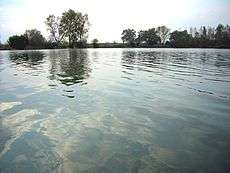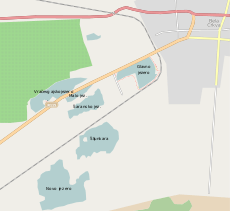Bela Crkva lakes
Bela Crkva lakes (Serbian: Белоцркванска језера, romanized: Belocrkvanska jezera) is a group of six larger and several smaller artificial lakes near the town of Bela Crkva,[1] in the southern Banat region in the Serbian province of Vojvodina.[2] Deep pits emerged as a result of gravel exploitation, and were subsequently filled by aquifers and rainfall. With clean and unpolluted water suitable for bathing, they are a popular travel destination.

Lakes

The lakes occupy the total area of 150 hectares (370 acres).[3] Larger ones include:
- The Main lake (Glavno jezero) or the City lake (Gradsko jezero) is situated closest to the town centre. It is the best equipped, and has several pebbly beaches, restaurants and paved paths.
- Vračev Gaj lake (Vračevgajsko jezero) lies further down the road towards the village of Vračev Gaj. It has a camp site with 200 camping spots,[1] some bungalows and a pebbly beach.
- Gravel pit (Šljunkara) is the largest lake, with a large beach and an island.
- Carp lake (Šaransko jezero) has a crystal clear water, is not developed for swimming[1] and is a good destination for fishing.
- New lake (Novo jezero) is the farthest from the town.
- Small lake (Malo jezero)
History
Exploitation of gravel in the area started in 1904. First, it was dug out manually and transported by horse carts, and then the process was taken over by excavators and railway transport. The gravel was used for roads and river embankments.[4] Industrial excavation began c.1948 and since then the pits were mostly created.[1] The gravel is still excavated only on the New lake.
Tourism
During summer, there are up to 5,000 visitors on the lakes' shores. Many cultural, entertainment and sports festivities are being held throughout the season. They include "Carneval of the flowers" and "Bela Crkva's apple picking".[1]
The lakes are especially popular among fishermen. In 1957, a wels catfish, which was 2.5 m (8 ft 2 in) long and weighted 70 kg (150 lb) was caught in the Main lake. In 1988 a story another massive catfish in the lake was published for the first time. It was named "Besi", an acronym of [Be]la Crkva and Ne[si], Serbian rendering of the name Nessie, the Loch Ness Monster. Ever since, a yearly tournament titled "Hunt on Besi" is held. It is estimated that by 2008 Besi has grown to 150 kg (330 lb). Catfishes of 30 kg (66 lb) are commonly caught in the lakes.[1]
References
- J.Danilović (13 June 2008), "Sedam jezera belocrkvanskog „primorja"", Politika (in Serbian)
- Жељко Бјељац; Јован Ромелић (10 November 2015). Туризам Вршачких планина. Geografski institut „Jovan Cvijić“ SANU. pp. 131–. ISBN 978-86-80029-65-8.
- Geografski položaj, Bela Crkva.rs, archived from the original on 2011-11-14
- Turizam, Bela Crkva.eu